Atelier Rorona Plus PS3 Review: A Good Game Becomes a Great Game
2010's Atelier Rorona gets an overhaul with an all-new Plus version. Cheap cash-in or an opportunity to fix the issues of the original? Pete takes an in-depth look.
This article first appeared on USgamer, a partner publication of VG247. Some content, such as this article, has been migrated to VG247 for posterity after USgamer's closure - but it has not been edited or further vetted by the VG247 team.
Having been around since 1997, Atelier is one of the more long-running Japanese game series. It wasn't until 2004 and the PlayStation2's Atelier Iris trilogy that we got our first taste of the series in the West, and since then it's continued to fly largely under the radar to all but those who are already "in on it," so to speak.
And that's a terrible shame, because these games represent a number of elements that many modern critics and players alike constantly bemoan the lack of: creativity, originality, inclusivity and, most importantly, soul.
If you're one of those people for whom the series has consistently flown under the radar, here's the gist: Atelier is a series of role-playing games that, for the most part with a few exceptions, focuses not on the usual "plucky band of heroes saving the world" plotlines, but instead on much smaller-scale narratives, usually centered around the titular character of that particular installment and their struggles to achieve something within a specific timeframe. The series typically -- though not exclusively -- features female playable protagonists, and the gameplay emphasis is very much on various implementations of alchemical-themed crafting rather than the JRPG staples of exploration and battles, though both of these aspects are also involved. Over the course of the series, the protagonists have been tasked with everything from proving to their school that they're not an incompetent alchemist to attempting to get back to their own time from the future.
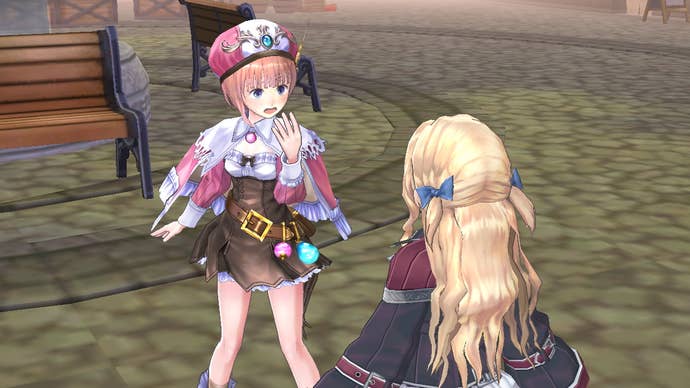
In the case of Atelier Rorona: The Alchemist of Arland, a 2009 release (2010 in the West) that not only brought the series to HD consoles but also abandoned the sprite-based art of prior installments in favor of polygonal 3D graphics, the eponymous heroine is tasked with running her own alchemy workshop in the small kingdom of Arland. Over the course of 12 assignments, protagonist Rorona must craft an increasingly complex array of items for the kingdom in order to prevent the workshop from being closed down and flattened to make way for factories. In order to do this she must collect ingredients from the areas surrounding town, battle monsters, learn new recipes, create new items and help to build up her reputation in the city -- a reputation left somewhat in tatters by her seemingly lackadaisical master Astrid.
The original Atelier Rorona was a competent game with a number of flaws that were subsequently addressed in the direct sequels Atelier Totori: The Adventurer of Arland and Atelier Meruru: The Apprentice of Arland. The game systems were subsequently refined further in the PlayStation Vita "Plus" ports of Totori and Meruru and the newer "Dusk" series currently comprising Atelier Ayesha and Atelier Escha & Logy, and the knowledge and skill developer Gust built up over the course of these games has since been applied to Rorona, the game in the series most in need of an overhaul.
In other words, this isn't simply a rerelease with additional content -- while we are seeing plenty of only very slightly enhanced ports of PS3 titles on PS4, it's a lot tougher to get away with a straight rerelease on the same platform the game originally came out on. So it's fortunate that Atelier Rorona Plus represents such a significant improvement over the original game that it should, quite rightly, be regarded as a completely distinct game -- and yes, that means that even if you've played and enjoyed Atelier Rorona before, picking up a copy of Plus is eminently worth your time and money. And if you've never played it at all before? Rorona Plus is the perfect place to start.
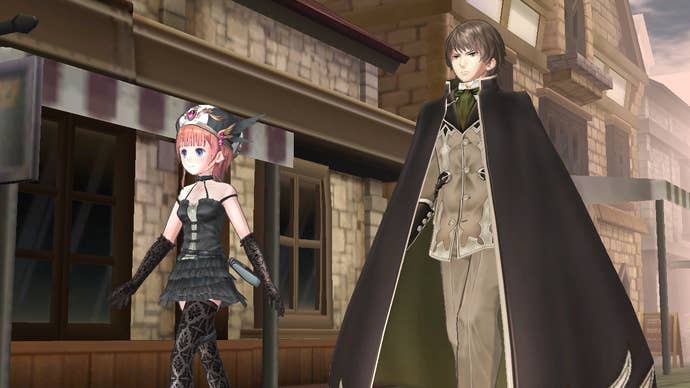
The original Atelier Rorona's strengths come from its convincing depiction of life in a small town where everyone seems to know one another. Rorona herself is depicted as a young, innocent girl somewhat lacking in confidence and assertiveness due to the fact that, prior to the events of the story getting underway, she'd always let other people take advantage of her without speaking her mind. When her parents got into debt with local alchemist Astrid, they sent Rorona to work for her to pay it off without a second thought, and she didn't complain. When Astrid openly mocks her and puts her down -- despite it quickly becoming apparent that Rorona's skills and work ethic clearly outshine her master -- she doesn't stand up for herself. When she's told that if the workshop shuts down she'll have to leave the kingdom, she doesn't point out that this should really be Astrid's responsibility, nor does she complain at Astrid's devious rebranding of the workshop as Rorona's establishment. Instead, she steps up to the challenge and -- assuming you're successful in guiding her through her three-year journey -- she comes through mostly unscathed, and a stronger person for surviving her trials.
In other words, what initially appears to be a story about a young girl being downtrodden by pretty much everyone surrounding her eventually becomes an inspiring tale of overcoming overwhelming odds through sheer determination. Rorona is a deeply relatable heroine, initially bewildered by her place in the world and unsure of her own abilities -- much like the player at the outset of the game. As the game progresses and she continues to successfully complete assignments, however, she grows as a character, and those who have previously sought to take advantage of her and doubt her abilities are left with no choice but to begrudgingly accept that she might actually know what she's doing. And yet she remains true to herself in the process -- she continues to be a point of purity and innocence in a world that is otherwise filled with selfish people.
What Atelier Rorona Plus successfully does is take that established story, expand it with some additional scenes not seen in the game's previous incarnation -- largely focusing around characters that were underdeveloped in the original, but also taking in a few bits of series fanservice for those who have since played Totori and Meruru -- and completely overhaul both the visuals and the gameplay systems.
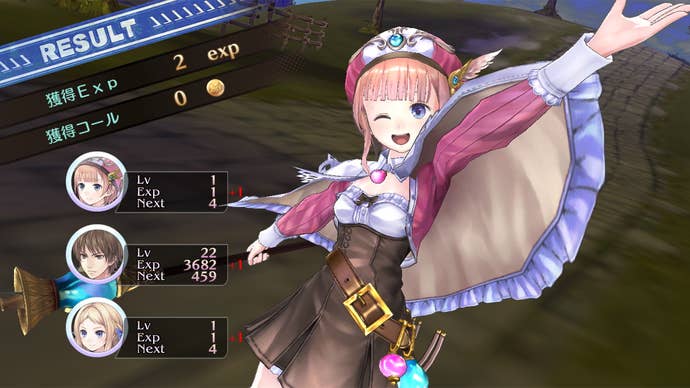
Let's start with the presentation. The original Atelier Rorona featured a stark disconnect between the appearance of the in-game 3D models and the beautiful, airy lines of the 2D artwork that accompanied dialogue and event scenes. The polygonal characters looked much too young in comparison to their 2D counterparts, and while this was less of an issue with Rorona, who was always supposed to be a young character anyway -- canonically she's 14, even though she was retconned as a 17-year old for the original North American release -- it was a little jarring when it came to older-seeming characters like the refined, dignified knight Sterk, who gives Rorona her assignments, or even Rorona's friend Iksel, who appears significantly more mature than Rorona despite only being one year her senior. Atelier Rorona Plus thoroughly addresses this issue with completely revamped character models that look much more in line with their 2D counterparts. The effect is much more convincing and consistent.
Elsewhere, the art has had less of an overhaul. The backgrounds are relatively simple -- particularly when Rorona goes out into the fields and dungeons surrounding Arland to collect ingredients -- and by themselves are unlikely to impress. However, when combined with the excellent character models, the game takes on a delightfully charming picture-book, fairy-tale feel firmly in keeping with the atmosphere created by the game's narrative.
Musically, the game features the same excellent soundtrack as the original Atelier Rorona. Gust's sound team is one of the finest in the business, and Rorona is a great example of them on top form. But Atelier Rorona Plus brings a wonderful additional bonus for longtime Gust fans -- buried within the save menu is the option to reassign music for various situations in the game to different tracks, and Gust has thoughtfully provided not only the original Atelier Rorona soundtrack, but selections from numerous other installments in the series stretching right back to 1997's Atelier Marie and also taking in spin-off series such as Mana Khemia and additional albums such as the three vocal arrangement Volkslied collections. There are even tracks from newer games such as Totori, Meruru, Ayesha and Escha & Logy to choose from if you so desire -- a nice touch.
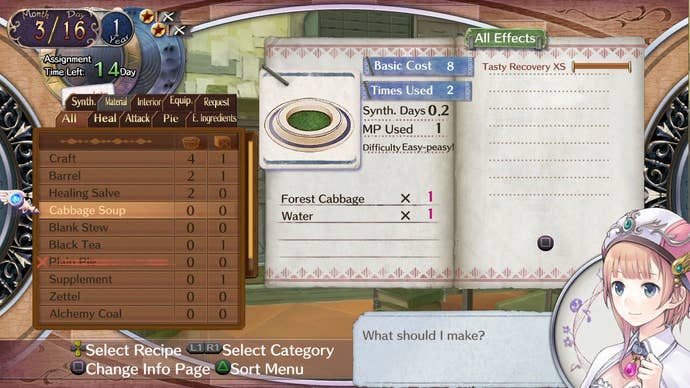
But how about the gameplay? The biggest criticism of the original Atelier Rorona was that it deliberately didn't explain a lot of its nuances to new players, and consequently demanded that you experiment in order to determine the best way to play. This isn't in itself necessarily a bad thing -- it can be enjoyable to figure out how a game works for yourself -- but some players found it frustrating. Rorona Plus addresses this with quick, simple and clear tutorials when you first come across a new gameplay element, with more detailed help available via an in-game help menu if you so desire. You still have to experiment to get the best results, but you're doing so from a more well-informed position to start with.
Even when you knew what you were doing in the original Atelier Rorona, though, you were sometimes at the behest of the random number generator rather more than was truly fun, making some of the assignments and sidequests rather more difficult to complete than they really needed to be. For example, certain tasks demand that you create an item with a specific "trait" attached to it: in the original Atelier Rorona, passing this trait on from ingredients to the finished product had a certain amount of luck attached to it, assuming you actually managed to gather an ingredient with the appropriate trait in the first place -- a matter again left up to random chance.
Atelier Rorona Plus, on the other hand, takes strong cues from Atelier Meruru in particular. There is much less luck involved, allowing you to be more strategic with which ingredients you use. Passing traits on is now a matter of selecting them from a list made up of all the ingredients' traits -- though the total number of traits you can attach to a finished item is determined by its "cost," so you still have to be careful you pick the right ones.
Simple interface refinements make the whole game a much more streamlined experience without sacrificing its depth, too. A fast-travel menu allows you to quickly jump from location to location in Arland, and this menu clearly marks when there's an event in a particular place, making it much more difficult to miss key events required for the game's multiple endings. Sidequests that improve your relationships with characters are now accepted from the same place you accept quests that improve your reputation with the town as a whole, making it much harder to forget about the existence of certain characters who could easily be neglected in the original. And, perhaps best of all, Rorona's inventory, which quickly gets cluttered with all the twigs, rocks, eggs, buckets of water and other junk you pick up over the course of the game, can now be both sorted and filtered according to various criteria, making it much easier to find the exact items you're looking for.
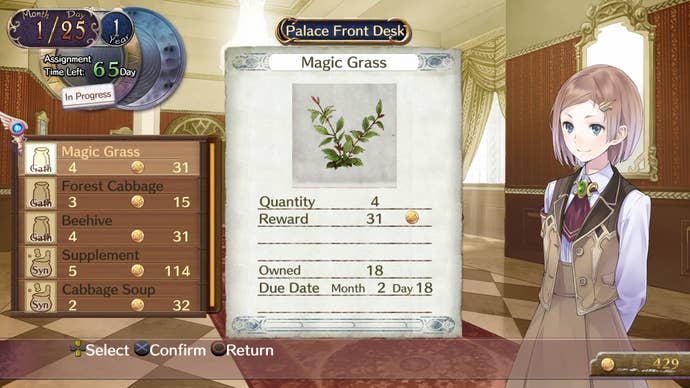
Even the main assignments have been tweaked and improved, too. While the main tasks are the same as in the original, there are now also a number of optional additional tasks you can complete during each assignent period, with successful completion rewarding you with stamps on a bingo card that can ultimately unlock everything from new recipes to stat improvements for Rorona. The best thing about these optional tasks is that they act as a subtle means of nudging you in the direction of where you should be at any given point in the narrative by, say, rewarding you for reaching specific levels, or for completely exploring specific dungeons, or for successfully crafting certain items. It's not necessary to complete all of the optional objectives to get all the bingo card rewards for an assignment, either; they simply provide a subtle means of suggesting what you might want to be doing if you're stuck for what to do next, because the game never spells out exactly what you should be doing at any given moment; you're trusted to manage Rorona's time effectively for yourself.
Atelier Rorona Plus is a delightful game. Its original incarnation was a charming but flawed title that was superceded by its direct sequels -- competent, but more of a curiosity to check out for completionism's sake rather than something to recommend wholeheartedly. Now, with its new Plus version, it's an immensely solid game in its own right -- deep and complex but accessible to newcomers; charming and friendly to all players; beautifully designed to be fun to play without wasting players' time. In short, it represents the very best of what Japan still has to offer the world of video games: a creative, original, inclusive and, most importantly, enjoyable title that is easy to get into, but which will keep you busy for a long time to come yet. And when you're done, there's plenty more where that came from!
VisualsWhile the 3D environments are a bit bland, they take on a picture-book quality when the gorgeous new character models are overlaid atop them. The 2D art, meanwhile, is simply beautiful, with a lovely airy, light, hand-drawn look to it.
SoundGust's sound team is on fine form with Rorona's soundtrack -- and longtime fans will be delighted to have the option to reassign in-game tracks to music from other games from the series' history.
InterfaceVastly improved from the original Rorona, the interface makes finding the items you need and combining them together a breeze without sacrificing gameplay depth. Smaller, quality-of-life improvements such as the fast-travel menu with event markers help reduce frustration when seeking specific endings or key events, too.
Lasting AppealThere's a lot of game here. A single playthrough will probably take you in the region of 20 hours or so, but with multiple endings you'll want to play through several times to see everything the game has to offer.
ConclusionFor Atelier veterans, Rorona Plus deftly addresses pretty much every criticism that could be levelled at the original Rorona while providing plenty of new content to enjoy. For Atelier newcomers, this is a solid, enjoyable and charming game that marks an ideal entry point into the broader series as a whole.
